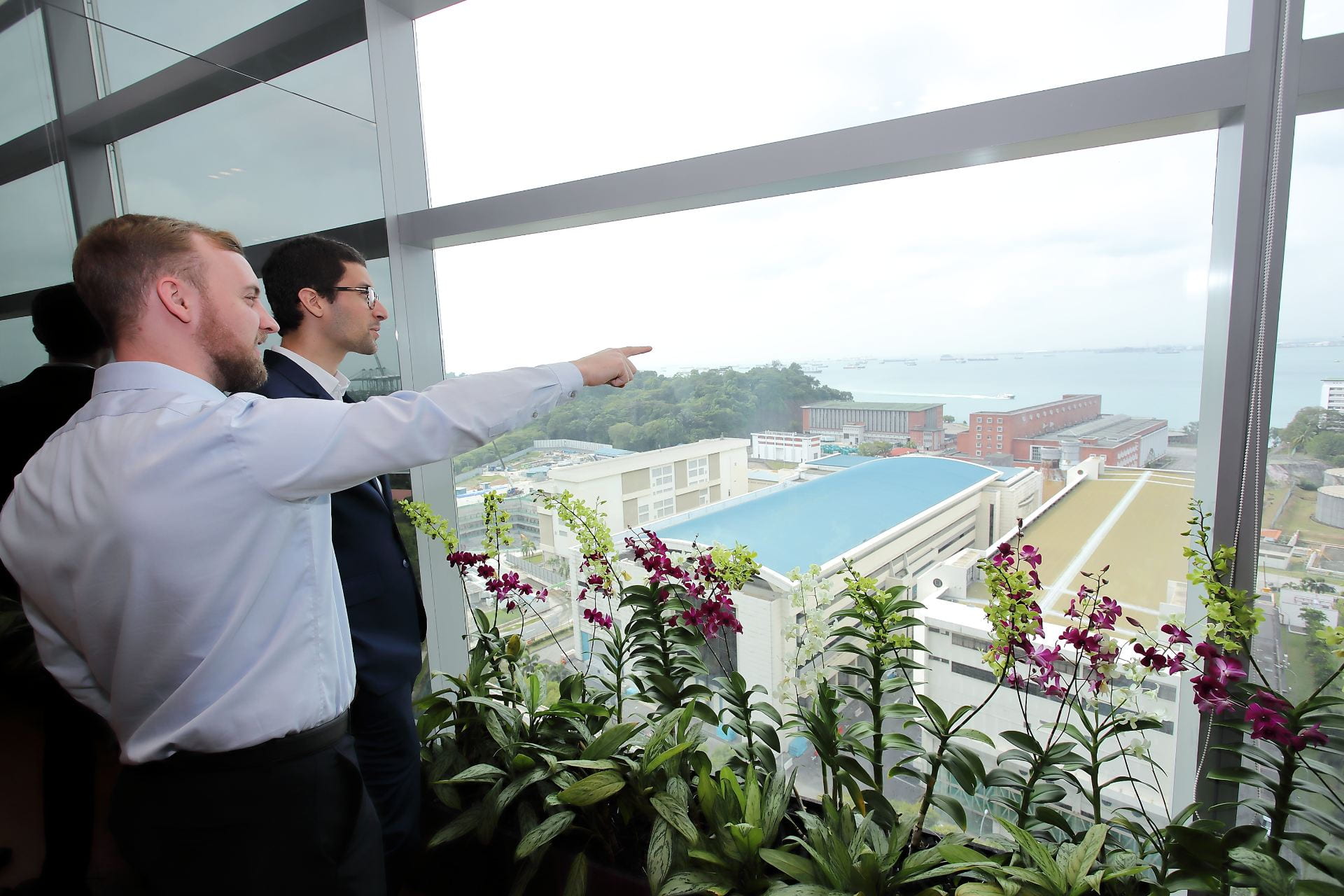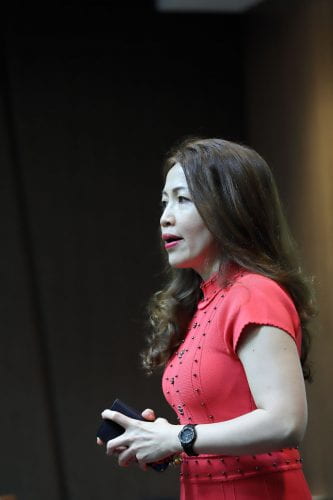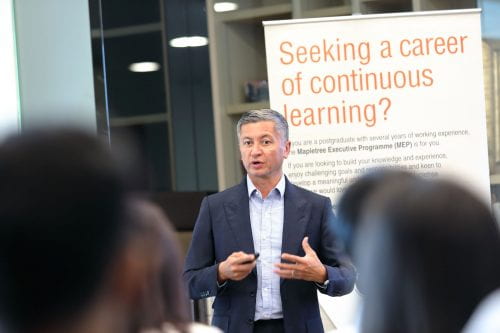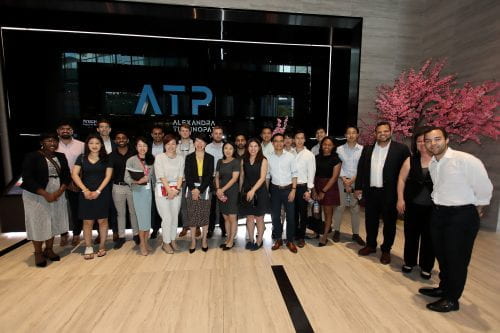
On the last and busiest day of the trek, Friday, January 10th, Baker students visited five different real estate firms and rounded out the trip with a reception for Cornell alumni from around the island as well as the executives of the companies visited throughout the week. Cornell alumna Sigrid Zialcita, CEO of the Asia Pacific Real Estate Association (APREA), welcomed students for the first morning session. Zialcita handily navigated the students’ questions concerning macroeconomic trends in the Asia Pacific region, with a particular emphasis on the growing demand for REITS as investment vehicles.

Ms. Zialcita pointed out that the Asia Pacific region has, rather quietly, enjoyed decades of growth with very few setbacks. When asked what factors have been responsible for such sustained growth, she pointed, without hesitation, to China. It is no secret that the Chinese economy has enjoyed a long period of continued growth, and the rising tide of China’s economy has raised all other Asia Pacific countries, as over 50% of the region’s GDP is tied in some way to the country. Moreover, the growing affluence of the Chinese middle class and their tastes and habits have bolstered the surrounding region’s growth. Like in developed economies, Chinese consumers enjoy travel and are heavy consumers, and much of that spending stays in the region. Even as low wage work has left China in the wake of this economic shift, it has shifted to other Southeast Asian nations like Vietnam and Indonesia rather than leaving the region for other parts of the globe.
Ms. Zialcita closed the discussion with a conversation on Singapore’s REIT structure, and the growing popularity of REITs in the region. Singapore, which APREA has duly chosen as its home base, has had a long-established marketplace for REITs that has been incredibly successful. As a result, other players in the region have looked to her and APREA for guidance on how to establish a REIT structure on their own exchanges. The largest of these potential players happens to be the Chinese government, which is making strides to introduce the investment structure into its own marketplace.
Following the visit with APREA, the group headed to the Harbourfront area to visit with a handful of fund managers. The first stop was with Mapletree Investments, where Regional CEO of Europe and USA Michael Smith walked the students through Mapletree’s current investments as well as its plans for growth in those regions.
Mapletree Investments, Smith explained, is a wholly owned subsidiary of Temasek Holdings, which in turn is a holding company for the Government of Singapore’s state-owned investment companies. Unlike CapitaLand, which is only 51% state-owned, and GIC, which invests across all different types of assets, Mapletree operates with complete autonomy and has a global presence of direct investment in real estate projects ranging from core office in Singapore to ground-up development in the Americas. In addition to its more traditional asset types, Mr. Smith noted that the firm has taken an increasing interest in alternative assets, like data centers, and the firm now has the industry’s fourth largest global logistics portfolio.

Mapletree’s investment strategy seemed to align closely with Keppel REIT, which was the next stop of the day. Keppel REIT is headed by CEO Paul Tham, another Cornell alumnus, and is listed on the Singapore Exchange. The company is the publicly traded real estate owner for Keppel Capital, and its assets are managed by Keppel REIT Management, so much of Mr. Tham’s responsibility it related to acquisitions and strategic growth of the portfolio.
Similar to Mapletree and others in the region, Keppel has taken a favorable view on data centers. This alternative asset has emerged as a valuable niche for those who understand its quirks, as tech giants continue to expand their global footprint and as the requirements for technology infrastructure continue to increase throughout the globe. For its part, Keppel has established the only pure-play data center REIT in Asia, and Mr. Tham explained some of the challenges facing owners of such assets. Not only do these facilities require an immense amount of energy to operate, but their components are also in need of constant upgrading lest they become obsolete. Perhaps the biggest challenge, however, is the fact that owners have very little pricing power, as their main tenants are constantly pressuring them for lower rents in order to curb their own soaring costs. All of these factors place owners of data centers in the unenviable position of managing the investors’ demand for such products with the inherent difficulties of their business model.
The second-to-last stop of the day was with Frasers Property, which was directly across the street from Keppel. Wanshi Zheng, Group Chief Strategy & Planning Officer, greeted students with a brief history of the firm and its surprising roots. The company has been in existence for well over a century but was founded initially as a beverage company by the manufacturers of Chang beer. In the 1960s the company began building retail and manufacturing facilities in strategic locations and began to realize the profitability of real estate. In 1983, Frasers developed the CenterPoint Mall and has since grown to become one of the largest commercial property owners and managers in the region, controlling multiple REITS in the retail and office sectors.
Students were given a tour of a formerly maligned office campus that Frasers brought back to life. Alexandra Technopark (ATP) featured a group of office towers connected by a series of underground tunnels. It has been marketed towards tech companies, particularly those coming out of Silicon Valley and hoping to establish a foothold in Asia, and has recently secured Google as its major anchor tenant. Ms. Zheng cited the campus-like environment as a major selling point since it is a rarity in Singapore, where land is often too expensive for such an arrangement.

Finally, as the culmination of a whirlwind week, the students moved to the laid-back atmosphere of the Warehouse Hotel. The property was developed within a former 19th century warehouse built a few hundred meters inland of Clarke Quay. As the scarcity of land demands buildings in the CBD go more and more vertical, it is difficult to secure historic properties such as this one in Singapore. The Warehouse Hotel proved to be an able shepherd of this property’s history and charm, paying careful attention to original details and found artifacts and delivering a tasteful collection of just under 40 rooms. The hotel, owned and operated by the Lo and Behold hospitality group, served as a gracious venue where the Baker students capped off the trek with a reception featuring familiar faces from the week’s meetings.
